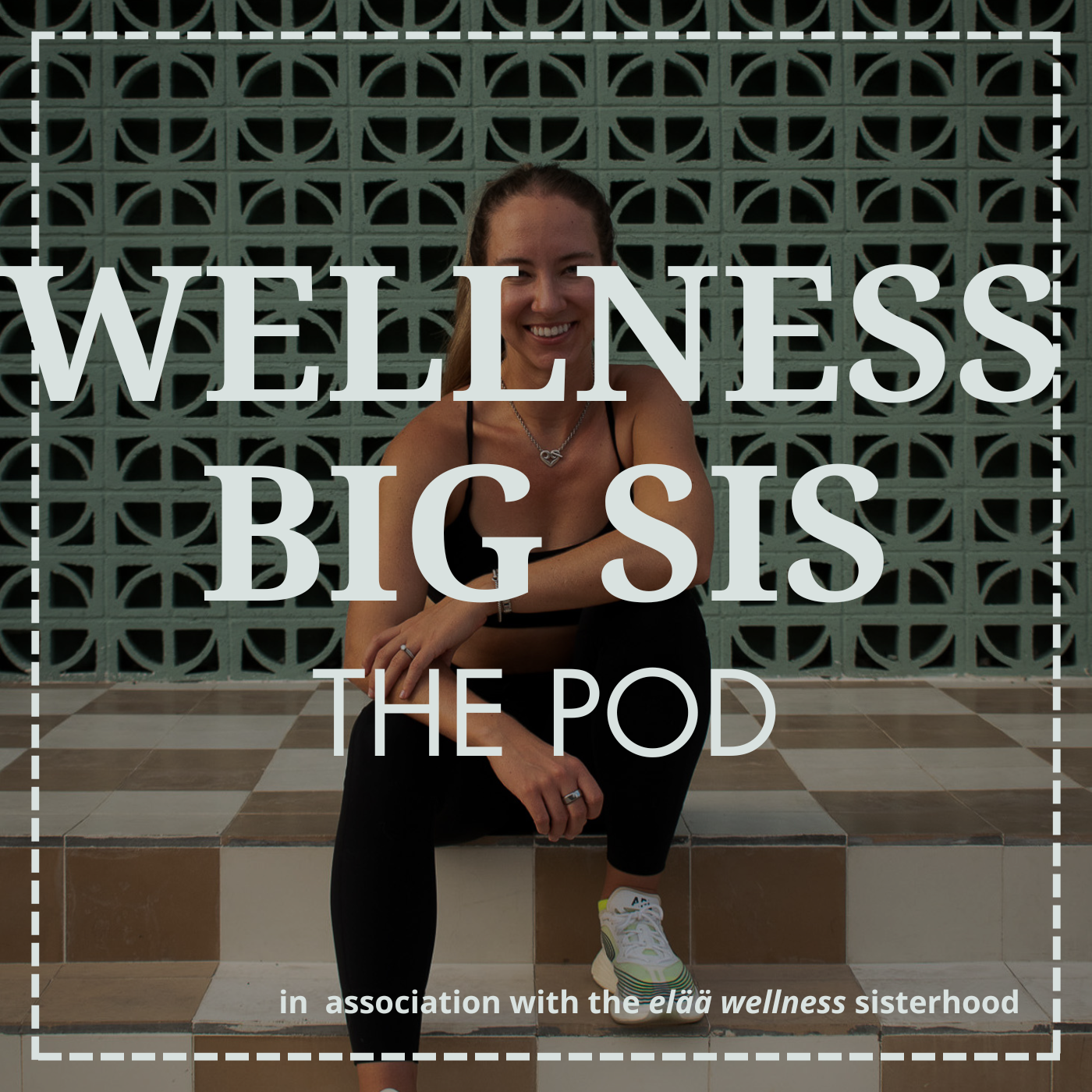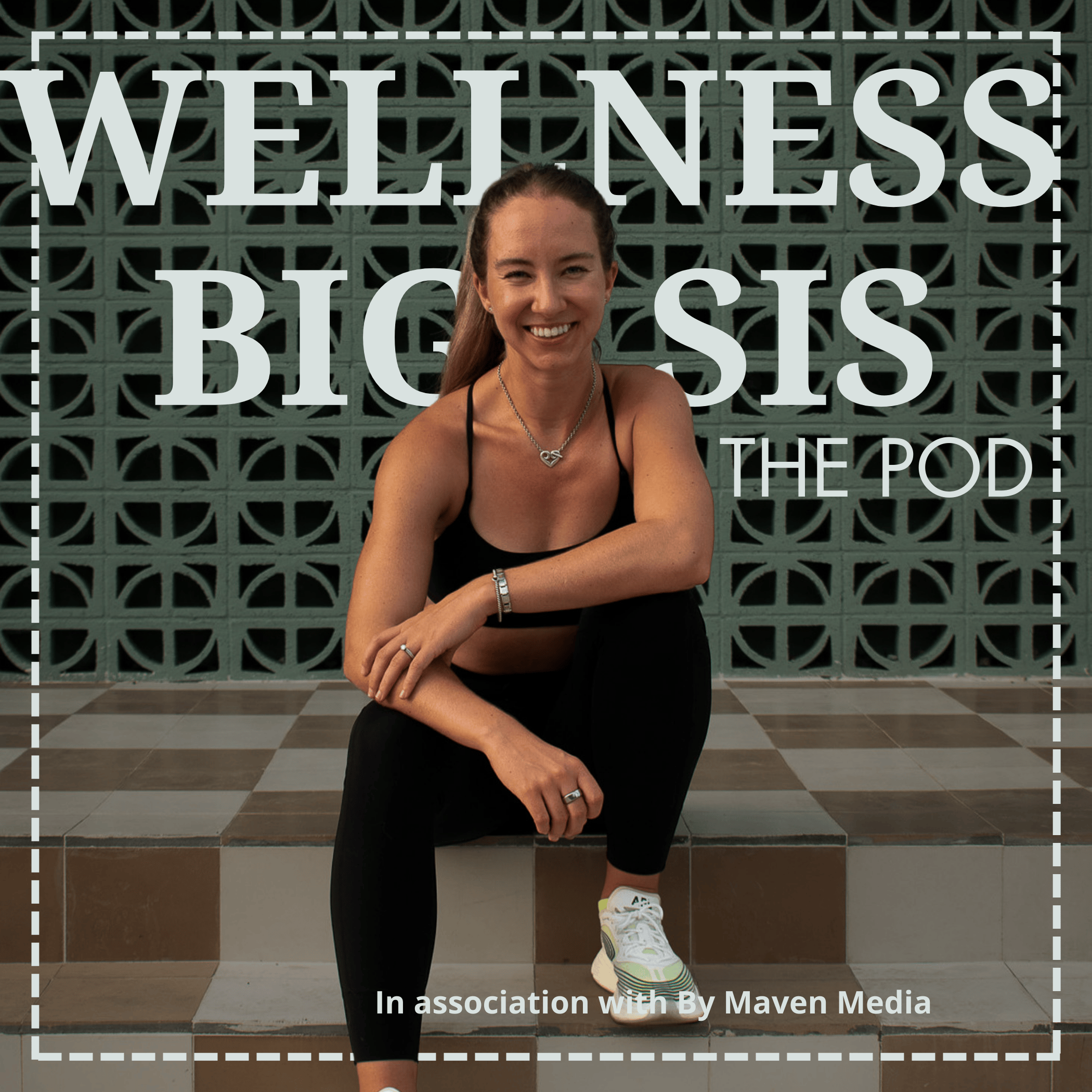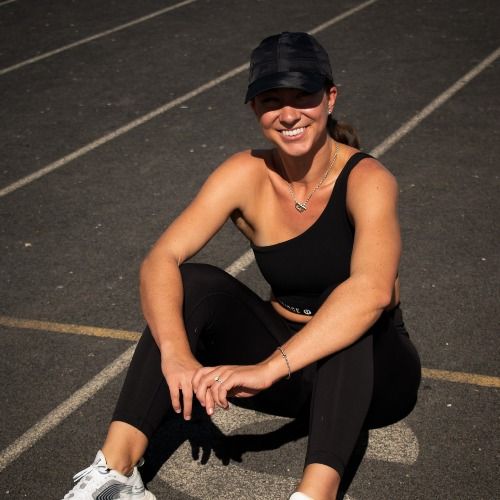75:: The one thing women DON'T need in their exercise handbags
Zone 2 Training: Do Women Really Need It?
Zone 2 training—steady-state cardio at 60–70% of your max heart rate—has been hailed as essential for endurance, fat burning, and longevity. But does the research actually apply to women?
In this episode, Dr. Kelsy Vick, board-certified Doctor of Physical Therapy and pelvic floor PT, breaks down the science of Zone 2 training and its role in women’s health, metabolism, and recovery. We’ll cover:
- What Zone 2 training really is (and how to calculate it)
- The cardiovascular and metabolic benefits for women
- Hidden downsides: time inefficiency, cortisol stress, and limited bone/muscle benefits
- Why women already have a natural advantage in fat oxidation and mitochondrial function
- HIIT, SIT, and polarized training vs Zone 2—what’s more effective?
- How to fit Zone 2 into your routine without guilt
If you’ve ever wondered whether you need 45–90 minutes of Zone 2 cardio five times a week, or if HIIT and strength training might be more efficient, this episode clears the air.
Tune in to learn how Zone 2 fits into your exercise handbag—and why it might be more of an accessory than an essential for women’s fitness.
loving the pod? click the follow button, & we'd love if you could leave a review! thank you x 1000 :)
sign up for the free Wellness Girl Chats newsletter!
Want a peak into what it is like building this business, the podcast interviews, and all things female founder BTS? sign up for the free Firstborn Daughter Diary
insta:: @dr.kelsyvickdpt & @wellnessbigsispod
youtube:: @dr.kelsyvickdpt
tiktok:: @dr.kelsyvickdpt & @wellnessbigsispod
sign up for our patreon for exclusive content & workouts!
Grab your very own Stakt Mat & Accessories for 10% off your order while also supporting the pod! (Thank you so much!):: https://shopstakt.com/?rave=DAW65UTUF4VNG7OV
Thorne Website:: https://s.thorne.com/Zgk7Y
My Thorne Dispensary & Recs:: https://www.thorne.com/u/drkelsyvickdpt
Message me for 35% off your Thorne orders!
00:50- 02:12 Introduction to Exercise Handbag Series
02:13- 05:09 Understanding Zone Two Training
05:10- 08:49 Zone Two Training: Male vs. Female Physiology
08:50- 10:16 Polarized Training Model for Women
10:44- 12:19 Incorporating Zone Two and Polarized Training (part 2)
Transcript
This next part of our exercise handbag
is going to deviate from the series
2
:just a little bit because it might
not be as essential as we previously
3
:thought, especially for women.
4
:So let's clear the air a
bit on zone two training.
5
:Specifically how zone two
training affects the female body.
6
:Welcome back to Wellness, fix the Pod.
7
:I'm your host, Dr.
8
:Kelsey Vic, a board
certified orthopedic Dr.
9
:Physical therapy and a pelvic
floor physical therapist.
10
:And this new series we've been
doing throughout September.
11
:I'm calling the exercise handbag
series because we are talking about
12
:some of the essentials to include
in your exercise handbag, where
13
:we all have different handbags.
14
:We all have different styles of handbags
that we enjoy, that we gravitate
15
:towards, just like we have different
forms of exercise that we might
16
:gravitate towards, but the essentials
in our handbag, the essentials in our
17
:exercise routine, especially as women.
18
:Should be pretty similar.
19
:We have our phones, our keys, our wallets,
just like in our exercise handbag, we also
20
:have some of the essentials that we want
as foundations in our exercise routine.
21
:So our first two essentials we
covered were high intensity interval
22
:training slash sprint interval
training, and then also jump training.
23
:High intensity interval training.
24
:Super controversial.
25
:So we dive into that in that episode.
26
:And then jump training is
27
:The secret sister that no
one really talks about.
28
:So we chat about jump training and how
beneficial it is for us as women in
29
:the previous episode and this week.
30
:Again, deviating a little bit talking
about zone two training and why it might
31
:not be as essential as we previously
thought, especially for women.
32
:So first of all, what
is zone two training?
33
:Zone two training is exercising at about
60 to 70% of your max heart rate or a max
34
:effort for a prolonged period of time.
35
:As a reminder, in order to
calculate your max heart rate,
36
:just do two 20 minus your age.
37
:So for someone who's 20
years old, two 20 minus 20.
38
:Estimated max heart rate would
be about 200 beats per minute.
39
:So exercising in that 60 to 70%
range of that heart rate zone
40
:will be your zone two training.
41
:Another way to look at it that we were
taught in school is that you can maintain
42
:a conversation but you can't sing.
43
:So if you're able to speed walk and
talk but not sing, that is that zone
44
:two moderate intensity training.
45
:When it comes to zone two training, most
of the research done on zone two training
46
:has been done on men, which is why I
wanted to dive into this topic today.
47
:Historically speaking, it's it's been
recommended to get about 45 to 90
48
:minutes of zone two training five times
a week, but a lot of that research
49
:has been done on the male body.
50
:so we'll dive into how that
contrasts with the female body.
51
:What are the benefits of zone two
training from an overarching perspective?
52
:One, of course, cardiovascular
benefits, heart health is huge, and
53
:zone two really does help with that.
54
:We also have the benefits of fat
oxidation and improved metabolism, and
55
:then we also can use zone two as active
recovery and mental health benefits of.
56
:So those are the overarching
benefits of zone two training
57
:for both men and for women.
58
:So what are some reasons we might
not wanna do zone two training and
59
:might wanna choose another form of
cardiovascular exercise to sort one of
60
:the cons is time inefficiency and guilt.
61
:It takes a good amount of time to
exercise for as long as we need to.
62
:At 60 to 70% of our max heart rate,
it's pretty easy to get to that 60, 70%.
63
:So in order to get those benefits.
64
:That we talked about, the
cardiovascular benefits, the
65
:metabolic benefits, all of that.
66
:We need to exercise for a very long
period of time, and someone might feel
67
:a little bit guilty not reaching that 90
minutes, five times a week recommendation
68
:that we've historically adopted.
69
:there's also limited stimulus for
adaptation, especially as we age.
70
:It is not hard enough exercise to help
with muscle mass or bone Mineral density,
71
:which we've already discussed, are
both things that we want to focus on,
72
:especially as we age, and it's not easy
enough to be active recovery, so it falls
73
:in this sort of like gray middle zone.
74
:With prolonged exercise, we can
have sustained cortisol increases.
75
:So if you're someone who has a high
baseline level of cortisol anyways,
76
:whether through work, stress, family
stress, life stress, just you're a
77
:chronic zone two exerciser where you're
doing that 90 minutes five times a week
78
:at 60 to 70% of your max heart rate,
you can have elevated cortisol levels
79
:for a more prolonged period of time.
80
:So extended moderate intensity exercise,
especially when combined with other
81
:stressors in life, can lead to elevated
cortisol levels, especially in women.
82
:Now let's zoom in a little bit more
specifically on why the female physiology
83
:differs from the male physiology when
it comes to zone two training women
84
:in general, as we mentioned in the
first essential series, have natural.
85
:superior mitochondrial
function than men do,
86
:we have more oxidative, meaning they
use oxygen type one skeletal muscle
87
:fibers that have a high mitochondrial
density and we actually have about
88
:a third greater mitochondrial
respiration as women compared to men.
89
:Women are also much more
metabolically flexible than men.
90
:We switch between.
91
:Utilizing carbs and fats
as fuel quicker than men.
92
:So a lot of the time men will do zone
two training to switch from that glucose,
93
:that carbohydrate fuel utilization to fat.
94
:For fat loss.
95
:As women, we are actually really
good at switching, and so we don't
96
:necessarily need as long of that
time at that moderate intensity
97
:to switch to that fat utilization.
98
:We do it relatively
quickly compared to a male.
99
:We're able to oxidize more fat and
less carbs than men during prolonged
100
:exercise at a similar intensity.
101
:We maintain a better cellular
energy homeostasis during exercise
102
:stress, and we have better built-in
fat burning efficiency, which
103
:is basically that fat oxidation.
104
:We have a greater abundance of fatty
acid transporters, meaning we're
105
:better able to use those fatty acids.
106
:Because we have more of that transporter
to utilize those fatty acids as energy.
107
:We also have more stored fat within
our muscles, which is easier to access
108
:compared to fat stored in other places.
109
:And so we're better able to tap
in to the fat, stored in muscle
110
:to utilize that for energy.
111
:And we have better mechanisms
for utilizing fat as fuel too.
112
:So because of our.
113
:Mitochondrial density
being higher than men.
114
:We also have more metabolic
flexibility able to switch
115
:between carbohydrates and fats.
116
:Zone two might not be as necessary for us.
117
:Since a few of the primary pros and
reasons to do zone two training is
118
:to train the mitochondria and utilize
fat for body composition changes.
119
:The fact that our bodies are already
structured to do that makes zone two may
120
:be less of a priority for us as women.
121
:It's not that it's bad for us, not at all.
122
:It's just that when building our
exercise handbags of essentials.
123
:The essentials we need in our routine,
why would we include something that
124
:takes so much time and that our body is
already naturally adapted for, rather than
125
:incorporating some of the other essentials
that we actually need, like high intensity
126
:interval training and sprint interval
training that our bodies aren't as
127
:set up for as our male counterparts.
128
:High intensity interval training and
sprint interval training have also
129
:been shown to be more beneficial in the
cardiovascular and metabolic realms.
130
:With less of a time commitment.
131
:So overall it's about bang for your buck.
132
:If you really enjoy
zone two cardio, do it.
133
:By all means, it's wonderful as long as
you have the appropriate cool down and
134
:the appropriate recovery in between.
135
:Zone two is great, and I'm not
discouraging at all, but if we're really
136
:trying to build that exercise handbags of
purely essentials that we can do across
137
:the board, it might be better bang for
your buck to incorporate another form
138
:of cardiovascular and metabolic based
activities like high intensity interval
139
:training and sprint interval training.
140
:So there are exceptions, of course.
141
:If you're training for something
long duration, lower intensity, or
142
:moderate intensity, like a marathon,
of course you need to do zone training.
143
:Specificity of training does matter, so
if you're training for something that
144
:is moderate intensity, long duration,
you are going to want to include zone
145
:two training in your current routine
for that training block, for that race
146
:or event that you're training for.
147
:As I was researching for this
episode, I came across another sort
148
:of training mindset when it comes to
cardiovascular training that I thought
149
:would be interesting to you guys too.
150
:It basically talks about polarized
training for cardiovascular training where
151
:if you can think of polarized opinions or.
152
:Polar opposites.
153
:They're on either side of the spectrum.
154
:So this research argues that especially
for women, it's really good if we spend
155
:the majority of our time in that black and
white zone on either end of the spectrum,
156
:not as much in that gray area, not as
much in that moderate intensity area.
157
:They advocate for spending time on either
side of the extreme, so 75 to 80% lower
158
:intensity training, less than 10% of
moderate intensity training like zone
159
:two, so not as much of that gray area,
and then 15 to 20% high intensity training
160
:mixed, of course, with strength training.
161
:And so thinking of that polarized training
model being super beneficial for women,
162
:knowing that we're spending time on
either sides of the extremes and not as
163
:much in that gray area, that middle zone.
164
:So there are a lot of studies showing
benefit in the twenties and thirties,
165
:forties and fifties, and 50 plus
age ranges for women utilizing this
166
:polarized training, especially with
improving your metabolism, improving
167
:fat utilization, body fat reduction,
and improved power and endurance.
168
:So thinking of that as an alternative to
this prolonged, moderate intensity work,
169
:working on either side of that spectrum
with that polarized training model.
170
:So how do we incorporate it
into our exercise handbag?
171
:Knowing what we know now and knowing
that zone two is maybe a little bit
172
:more optional than what we previously
thought, especially for women.
173
:If you wanna include zone training
because you enjoy it, not necessarily
174
:training for anything specific, limit it
to about one to two sessions per week.
175
:You can also use it for active
recovery in between your main sessions.
176
:It shouldn't be the primary focus of your
cardiovascular training, but of course
177
:you can use it for mental health reasons.
178
:If you wanna try more of a polarized
training model, exercising in
179
:those black and white zones and
not as much in that gray zone.
180
:Shoot for 30 minutes of walking each day.
181
:Again, that's that lower intensity range.
182
:And then 15 to 25 minute high
intensity interval training
183
:sessions about two to three times
per week on non-consecutive days.
184
:As we talked about in our essentials
course in our first episode of the
185
:Exercise Handbag Essentials series.
186
:And if you do want to exercise in that
zone two range because you enjoy it,
187
:because it's easy to do with a friend.
188
:Always think, am I in zone two?
189
:am I able to carry on a
conversation without singing?
190
:That's a really good gauge as
to know whether or not you truly
191
:are in that zone two range.
192
:So jogging with friends, cycling around
your neighborhood at a leisurely place.
193
:Dance, cardio, sculpt flow
classes, Pilates flow classes.
194
:Always you can incorporate zone two
training if you enjoy it, if it's
195
:something that you really love to do.
196
:Knowing that it's not necessarily
essential and definitely not a
197
:foundational element for our exercise
handbags, especially as women.
198
:I know that probably
surprised some of you.
199
:I hope you enjoyed this episode.
200
:I hope you learned more why our bodies as
women might not respond as well to zone
201
:two training as men or might not need
it as much as our male counterparts do.
202
:But I hope you learned something.
203
:I hope you enjoyed this episode.
204
:I hope you're enjoying this series so far.
205
:I'd love to hear from you guys to see
what you've learned and how you're
206
:incorporating it into your own routines.
207
:But thank you guys so much for listening,
and I'll see you guys again on the next
208
:episode of Wellness Fixes of the Pod.


